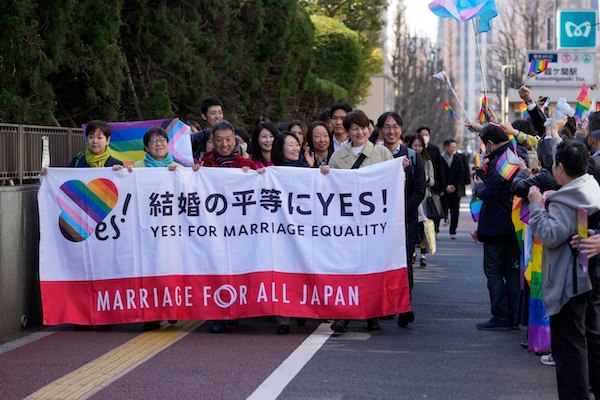On Thursday, March 14th, the Sapporo High Court in Japan ruled that the government’s ban on same-sex marriage is unconstitutional and called for urgent government action to address the lack of laws allowing same-sex unions.
This ruling is the first time a high court in the country has declared the ban explicitly unconstitutional. The Sapporo High Court explained that the ban violated both Article 14 and Article 24 of Japan’s constitution. The two articles essentially state that all people should be treated equally and that consenting adults have the right to choose who they marry.
Immediate Reactions
Kiyofumi Saito, one of Sapporo’s High Court judges, stated that the constitutional freedom of marriage is about the partnership between two human beings and that the right to marry should equally protect couples of both different and same sexes. Justice
Saito further stated that, with their exclusion, same-sex couples have experienced significant disadvantages, suffering, or loss of identity.
“Disallowing marriage to same-sex couples is a discrimination that lacks rationality,” the ruling said. It also stated that allowing same-sex marriage creates no disadvantage or harm to anyone.
One of the six plaintiffs, Eri Nakaya, said that the so-called “traditional” definition of marriage repeatedly made her feel that same-sex couples are treated as if they do not exist. “The ruling clearly stated that same-sex couples have the same right as others and deserve to live in this country, and reminded me it’s okay just to be me,” she said.
The court emphasized that marriage equality is a fundamental human right and that all individuals, regardless of sexual orientation, should be afforded equal treatment under the law.
The Bigger Picture
The ruling has been met with widespread celebration and relief among Japan’s LGBTQ+ community, who have long fought for recognition and acceptance in a society where traditional norms and values often prevail. Many activists and supporters see the decision as a significant victory for human rights and a crucial step towards achieving full equality for LGBTQ+ individuals in Japan.
The Sapporo High Court’s ruling has also sparked renewed debate and discussion about LGBTQ+ rights in Japan, with many calling for legislative action to enshrine marriage equality into law. Currently, the Japanese government does not recognize same-sex marriage, as Japan’s civil law and family registration law provisions apply only to marriages between men and women. The Sapporo High Court does not have the authority necessary to overturn these laws.
While the Sapporo High Court’s decision sets a powerful precedent, it remains to be seen how the Japanese government will respond and whether lawmakers will actually take action and amend existing legislation to reflect the court’s ruling.
In the meantime, LGBTQ+ rights advocates are celebrating the court’s decision as a significant milestone in the fight for equality and justice. The ruling sends a clear message that discrimination against LGBTQ+ individuals has no place in Japanese society and that all people should be treated with dignity, respect, and equality under the law.
As Japan continues to grapple with issues of LGBTQ+ rights and inclusion, the court’s ruling serves as a beacon of hope for those fighting for equality and justice. It reminds us that progress is possible, even in the face of entrenched social norms and legal barriers. With the momentum generated by this historic decision, many hope that Japan will soon join the growing list of countries around the world that recognize and affirm the right of all individuals to marry the person they love, regardless of gender.


